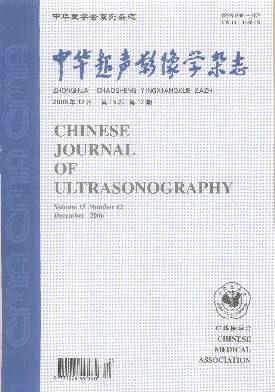The changes of transcranial sonography in end-stage renal disease with restless legs syndrome
Q4 Medicine
引用次数: 0
Abstract
Objective To discuss the neuroimaging characteristics of transcranial ultrasound in end-stage renal disease (ESRD) with restless legs syndrome. Methods Transcranial sonography (TCS) was performed in ESRD with restless legs syndrome (RLS+ group, n=41), ESRD without restless legs syndrome (RLS- group, n=57) and control group (n=47), who were enrolled in the Second Affiliated Hospital of Soochow University from January 2017 to December 2018. The differences of the neuroimaging characteristics of TCS in substantia nigra (SN), brainstem raphe (BR) and red nucleus(RN) among the three groups were analyzed. Results The rate of SN hypoechogenicity was significantly higher in RLS+ group (36.6%, 15/41) than that in RLS- group (19.3%, 11/57) and control group(8.5%, 4/47) (χ2=10.6, P<0.05). The rate of abnormal BR echogenicity was significantly higher in RLS+ group (34.1%, 14/41) and RLS- group (29.8%, 17/57) than that in control group(10.6%, 5/47) (χ2=7.7, P<0.05). The rate of RN hyperechogenicity was significantly higher in RLS+ group (51.2%, 21/41) than that in RLS- group (21.1%, 12/57) and control group (10.6%, 5/47) (χ2=19.8, P<0.05). Between RLS+ and RLS- groups, when SN, BR and RN were all of positive performance, the accuracy of diagnosing RLS+ reached 70% (7/10). Conclusions The echogenicity changes of SN, BR and RN on TCS could provide valuable neuroimaging information for the clinical diagnosis and treatment of ESRD with restless legs syndrome. Key words: Ultrasonography, Doppler, transcranial; Substantia nigra; Brainstem raphe; Red nucleus终末期肾病伴不宁腿综合征的经颅超声改变
目的探讨终末期肾病(ESRD)伴不宁腿综合征的经颅超声影像学特征。方法2017年1月至2018年12月在苏州大学第二附属医院收治的ESRD合并不宁腿综合征(RLS+组,n=41)、ESRD无不宁腿综合征(RLS-组,n=57)和对照组(n=47)患者行经颅超声检查(TCS)。分析三组患者黑质(SN)、脑干中缝(BR)、红核(RN) TCS神经影像学特征的差异。结果RLS+组SN低回声率(36.6%,15/41)显著高于RLS-组(19.3%,11/57)和对照组(8.5%,4/47)(χ2=10.6, P<0.05)。RLS+组和RLS-组BR回声异常率分别为34.1%(14/41)和29.8%(17/57),显著高于对照组(10.6%,5/47)(χ2=7.7, P<0.05)。RLS+组RN高回声率(51.2%,21/41)显著高于RLS-组(21.1%,12/57)和对照组(10.6%,5/47)(χ2=19.8, P<0.05)。在RLS+组和RLS-组之间,当SN、BR和RN均为阳性表现时,RLS+的诊断准确率达到70%(7/10)。结论TCS上SN、BR和RN的回声变化可为ESRD合并不宁腿综合征的临床诊断和治疗提供有价值的神经影像学信息。关键词:超声,多普勒,经颅;黑质;脑干中缝;红核
本文章由计算机程序翻译,如有差异,请以英文原文为准。
求助全文
约1分钟内获得全文
求助全文
来源期刊

中华超声影像学杂志
Medicine-Radiology, Nuclear Medicine and Imaging
CiteScore
0.80
自引率
0.00%
发文量
9126
期刊介绍:
 求助内容:
求助内容: 应助结果提醒方式:
应助结果提醒方式:


